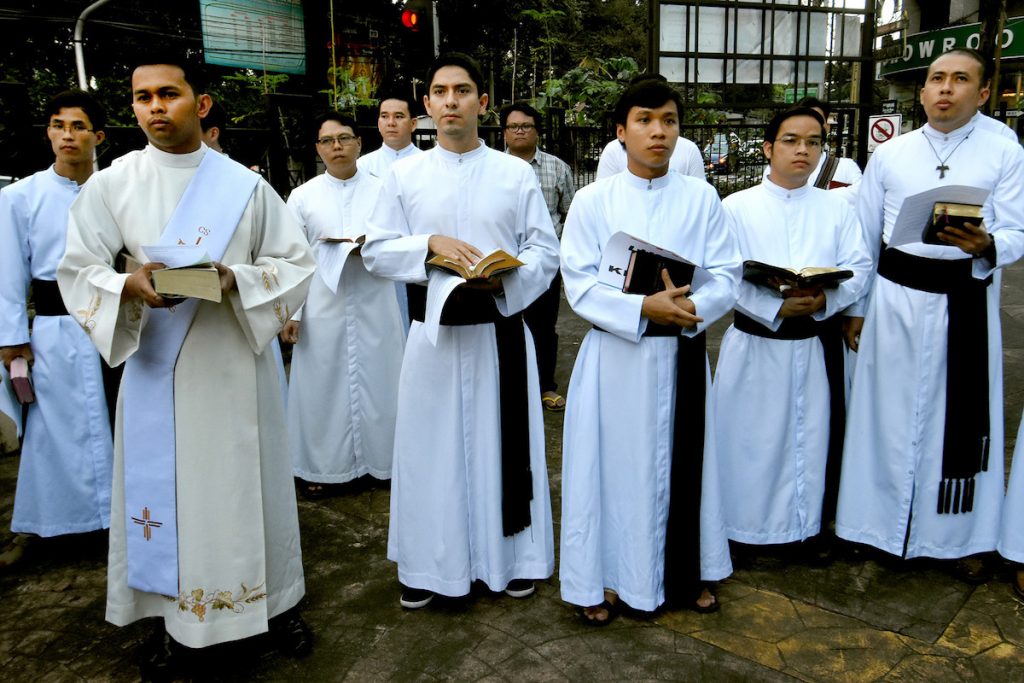A Catholic school in the central Philippines announced that it will cease operations due to “difficulties” that the coronavirus pandemic brought to the institution.
The Angelicum School in Iloilo, an institution run by the Order of Preachers since 1978, announced that it will stop operations on July 31.
In a letter to parents, Dominican priest Maximo Gatela, school director, advised students to either opt for a home study program or transfer to another school.
While the country gradually shifts to a “new normal” due to the pandemic, several Catholic educational institutions are facing “hard times.”
Some opted to dismiss workers, especially those described as having “special working status” with the institution, like support staff.
The University of Santo Tomas Hospital, an institution also run by the Dominicans, earlier announced its plan to terminate workers due to financial losses.
Financial challenges
Father Nolan Que, a member of the board of trustees of the Catholic Educational Association of the Philippines, admitted that most schools “struggle in terms of financial survival” due the pandemic.
He said that there were a lot of “unsettled tuition” in the past school year, resulting in lack of funds to pay for the salaries of teachers.
The priest, however, said that despite the difficulties “[it] does not mean that we should not be charitable to our employees.”
“It is now high time to be real witnesses to them,” said Father Que.

He said that a “consensus” among Catholic schools is to make it a point that “hopefully, nobody will lose job.”
“That’s a commitment,” said the priest, who is director of six Catholic schools in Manila.
He said, however, that he had no choice but to implement the “no work, no pay policy,” which was approved by the country’s Department of Labor when the schools closed due to the pandemic.
“I have people who are provisional employees, not regular ones, some of them are in the provinces because they were able to go home before the lockdown,” said Father Que.
He advised them not to come back to Manila “because we still do not have any certainty on what will happen next.”
The priest suggested that it would be better for the workers if they find a job in the province.
“They should know that they might not have anything to expect so that they can move on,” he said.
Catholic seminaries, too
Even Catholic seminaries in the Philippines are facing the same financial challenges due to the pandemic.
Bishop Gerardo Alminaza of San Carlos said 43 percent of seminarians who studied in the diocese failed to pay the full tuition during the last school year.
Seminary administrators have expressed worry that due to the financial deficit they might not be able to pay the salaries of the staff.
“It’s hard, but we can’t tell our personnel and faculty: ‘Sorry, we can’t pay for you anymore’,” said the bishop. “So, we have to find ways to provide for them,” he said.
When he was first assigned in the diocese, Bishop Alminaza came up with a “Stewardship Philanthropic Office,” which aims to “cultivate philanthropy or the culture of giving.”
Under the office is a program dubbed “The Giving Circle” wherein a network of people regularly contributes financially for certain advocacies.
The bishop said the contribution is now being used to support faculty and other staff of the diocese.
“We also have investments under a private family that includes the Church as members of the board,” he said. “From there we get a good amount of share,” said the bishop.

He said the diocese is not only dependent on the collection from Masses, adding that they are even going to venture into selling vegetables “to keep them moving.”
“We pull all strings just to provide because the value and the goal is that as much as possible, no one will lose their jobs,” he said.
Private schools seek help
An organization of private schools has already sought assistance from the government, particularly on behalf of school personnel and students, amid the pandemic.
In a statement, the Coordinating Council of Private Educational Associations said the private education sector “is one of the sectors seriously affected” by the lockdown.
The group said it welcomes “any government support in any form” to students, parents, and schools across education programs.
The group also asked for the inclusion in the social amelioration packages the educational costs and needs of students and financial assistance to teachers and school personnel.
The group had earlier called for the “immediate and urgent release of funds” to the Department of Education for the disbursement of government subsidies for students in private basic education.
Joseph Noel Estrada, managing director of the organization, warned that unless the education sector given aid “it will die slowly.”
Currently, about 263,000 teachers are employed in private basic education schools and 77,000 work as faculty in private colleges and universities nationwide.
Education Secretary Leonor Briones said she is aware of the situation of private school teachers. “Amid the outbreak, they’re informing us about their problems and about their issues,” she said.
She admitted, however, that there are certain limits on how the government can respond to the concerns of private schools.
“For example, the needed assistance for the teachers, we don’t have legal basis for this,” she told a Senate inquiry on the impact of the pandemic on education.
The education secretary agreed that with the looming closure and decline in revenues of private schools, private school teachers should also be given “economic protection.”
Jose Torres Jr. contributed to this report.






